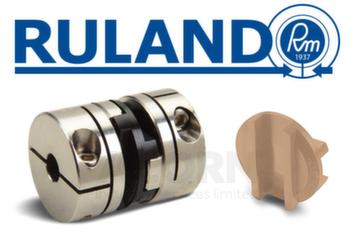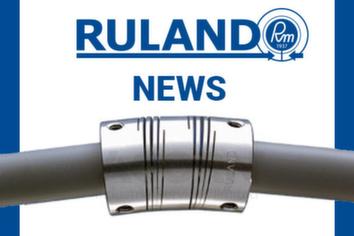Torsionally rigid couplings, such as disc and composite couplings, are suitable for most industrial applications and can feature zero back-lash, low-restoring forces, and electrically insulated designs.
ACORN can provide disc couplings for all applications, including ATEX, from leading manufacturers such as KTR, RENOLD and RULAND, along with REXNORD’s Addax composite couplings which has been designed specifically for cooling tower applications.


Torsionally-rigid couplings have several advantages that make them extremely crucial for industries. Some of the major advantages are as follows:
Zero Backlash: This is necessary for precision torque transmission, such as in robotics and CNC machinery.
High Torsional Stiffness: The high torque loads will not be subjected to twisting and thus are suitable for heavy industrial machinery.
Resilience: They are manufactured from solid materials so that they can resist harsh environments and continuous usages without generating heavy maintenance costs.
Low Restoring Forces: This reduces the stress exerted on the connected members, hence elongating their life and avoiding excessive wear.
Electrical Insulation: This feature avoids electrical interference that may damage sensitive equipment; this is quite important where the operation to be performed involves electronic equipment.
Versatility: These bearings come in different configurations to suit particular needs, as may be necessary for high speed operations or when a corrosion-resistant environment needs to be ensured.
Maintenance-Free: The bearing is designed to provide an extended lifetime of operation with very minimal maintenance, hence reducing operational costs.
Though torsionally rigid couplings are designed for durability and low maintenance, periodic inspection and upkeep are exceptionally vital for this device to realize optimal performance and a long service life. Critical maintenance tasks include:
Inspections at regular intervals: Look for wear, corrosion, or damage. Early warning prevents expensive downtime.
Lubrication: Couplings may require periodic greasing; follow the recommended schedules by the manufacturer.
Alignment checks: Correct alignment avoids unnecessary stresses in the system which may lead to untimely breakdowns.
Tighten Bolts: It is necessary to develop a proper habit of tightening the bolts at intervals in order to maintain the hold on the connection.
Cleanliness: Keep couplings and surroundings clean in order to avoid dirt accumulation as well as wear.
Monitoring performance: Observe unusual noises or vibration to provide warnings.
Replace Worn Parts: Replace any worn parts noticed with genuine parts from the same manufacturer.
At ACORN industrial services, our offerings extending beyond just torsionally rigid couplings. We are committed to providing other couplings & drives products to meet your industrial needs:



Torsionally rigid couplings are those that join two ends of a shaft within a machine, providing the drive with variable speed and an unaffected torque transmission without twisting of the shaft. As a result of such features, they are suitable for high torque loads and require accurate positioning/alignment of components that are linked by them.
Torsional stiffness refers to the capacity of the coupling to resist twisting under load. High torsional stiffness will help the coupling withstand large amounts of torque without deformation; this property is much desired where high accuracy and reliable torque transmission are required.
A rigid coupling is one that connects two shafts to work together in a single piece without giving way; it is not flexible and will provide exact shaft alignment. On the other hand, a flexible coupling allows angular, parallel, or axial misalignment and movement between connected shafts.